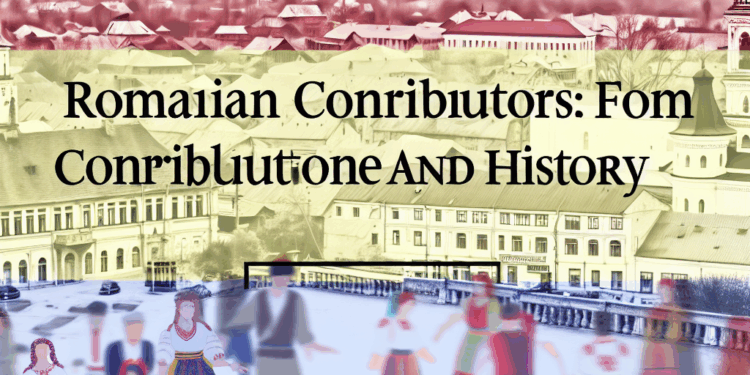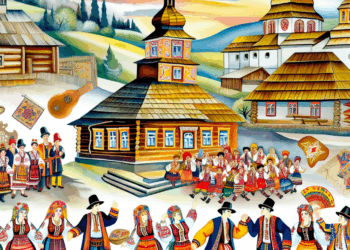Name: Mikhail Ivanovich Kotsyubinsky
Years of life: 1864-1913
Nationality: Ukrainian
Introduction
Bukovyna is a region with a rich history and diverse culture, which for centuries has been at the crossroads of different peoples and cultures. In its history, the names of many outstanding figures stand out vividly. One of them is Mykhailo Ivanovych Kotsyubynsky, a Ukrainian poet and writer whose works have become a landmark for Ukrainian literature and had a significant impact on the development of national identity.
The context of the era
At the end of the 19th and beginning of the 20th century, Ukraine was going through a difficult period in its history. The political situation was unstable, European countries were striving for modernisation, and at the same time Ukrainian society was searching for its roots, identity and cultural traditions. At this time, Ukrainian literature was only beginning to emerge from the shadow of Russian influence and was trying to find its own style.
Kotsyubinsky became one of those who called for the Ukrainian people to realise their own identity. He lived and worked at a time when the need for self-expression in literature and art was becoming extremely urgent for Ukrainians.
Early years
Mykhailo Kotsyubynsky was born on 17 September 1864 in the village of Vorobiyivka (now part of Chernivtsi region). He came from an average peasant family, and from an early age he showed an interest in literature and culture. After completing his primary education, he entered the Chernivtsi Teachers’ College, where he became more active in literary work.
After graduation, the future writer worked as a teacher in various villages and towns of Bukovina, where he gained rich experience and impressions, which became the main source of his inspiration. This time for him became not only a period of professional development, but also an important page in his biography, full of meetings with bright personalities, cultural figures and ordinary people.
Literary activity
Kotsyubinsky began writing in the 1880s, first as an author of essays and articles for local newspapers. However, his literary fame is firmly linked to the publication of short stories and novels. In 1897 he published his first famous work – “The Dream”, which became a precursor of his creative method, based on the vivid depiction of the inner world of man and his feelings.
His works often explore complex social issues such as national identity, culture and human relationships. Much of his work focuses on nature, its beauty and importance to the human soul. In this context, Shadows of Forgotten Ancestors, one of Kotsyubinsky’s most famous works, has become a symbol of Ukrainian culture and identity.
Significance of Kotsyubinsky’s work
Mykhailo Kotsyubinsky’s works have left an indelible trace in Ukrainian literature and art. He became one of the founders of a new genre – Ukrainian psychological prose. Fulfilling his destiny on the verge of realism and symbolism, Kotsyubinsky used complex metaphors and images to convey the feelings and experiences of his characters.
His work paved the way for other Ukrainian writers such as Lesya Ukrainka and Volodymyr Vynnychenko, and it continues to influence modern literature. Kotsyubinsky also became a symbol of a time when Ukrainians were searching for their own cultural identity and seeking to renew their national self-awareness.
Social and political activism
It was not only his literary prowess that Kotsyubinsky achieved. He actively participated in public life, supported the ideas of Ukrainian national revival, co-operated with various cultural and educational societies. The most important event for Mykhailo and for the whole Ukraine was his participation in the organisation “Prosvita”, aimed at the development of school education and the Ukrainian language.
Influence in Bukovina and beyond
Kotsyubinsky played a key role in shaping modern Ukrainian culture and language. His writings largely shaped literary style, and his ideas that Ukrainian culture and language were worth developing and protecting became fundamental to the impending national revival in the early 20th century.
In addition, Kotsyubinsky was active in the creation and development of Ukrainian cultural programmes, organising events to promote Ukrainian literature and the importance of preserving cultural heritage. He also became a figure in strengthening cultural ties between Ukrainians and other nations, which contributed to a wider acceptance of Ukrainian culture.
Personal life
Kotsiubinsky’s personal life was also rich and complicated. He was married to Anna, with whom he had several children. However, family life was not always easy: living in different conditions, financial problems and the need to combine the labour of a teacher with literary activity influenced his existence. In 1913, Kotsyubinsky died of tuberculosis, leaving behind a rich literary legacy.
Legacy
The death of Mykhailo Kotsyubinsky was not the end of his influence on Ukrainian literature and culture. His works continue to be published, studied in schools and universities, and his ideas remain relevant to this day. In Chernivtsi streets are named after him, and his books are studied in the school curriculum. Kotsyubinsky’s legacy has become an important element not only of Bukovyna, but also of the Ukrainian cultural landscape.
Conclusion
Mykhailo Kotsyubinsky is a figure who has left a deep mark on the history of Bukovyna and Ukraine as a whole. His influence extends far beyond literature. He became a symbol of an era in which Ukrainians sought and found their identity, contributing to the revival of the national spirit. His writings will inspire future generations, and may his words live on in the hearts of those who seek to understand the depths of the human soul and the cultural roots of their nation.
Sources
-
- Literary archives and research on the life and work of Mykhailo Kotsyubinsky.
-
- Books and articles about the cultural history of Bukovina in the late 19th and early 20th century.
-
- Information materials on the development of Ukrainian literature and national movement.








